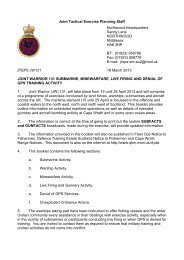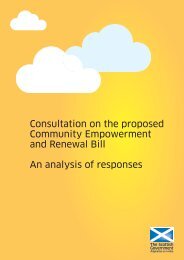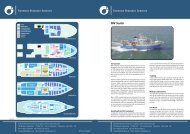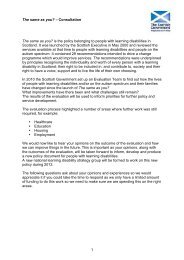Services that Manage the Care Needs of Drunk - Scottish Government
Services that Manage the Care Needs of Drunk - Scottish Government
Services that Manage the Care Needs of Drunk - Scottish Government
Create successful ePaper yourself
Turn your PDF publications into a flip-book with our unique Google optimized e-Paper software.
Many services employ trained (and licensed) Emergency Medical Technicians<br />
(EMTs, roughly equivalent to a paramedic in <strong>the</strong> UK).<br />
3.13 It would appear <strong>that</strong> different levels <strong>of</strong> staff are employed in sobering centres.<br />
For example, an on-line job advertisement for a “Sobering Technician Senior /<br />
PRN” placed by <strong>the</strong> Santa Fe County Human Resources Department<br />
(advertised in April 2008 and still unfilled in August 2008) stipulated minimum<br />
qualification <strong>of</strong>:<br />
• High school diploma or equivalent plus two years <strong>of</strong> experience in<br />
performing duties relevant to <strong>the</strong> post<br />
• Current State <strong>of</strong> New Mexico and / or National Registry EMT-Basic license –<br />
must be in good standing.<br />
• Possession <strong>of</strong> a valid driving license.<br />
3.14 An advert for a “Sobering Technician” posted on <strong>the</strong> same website did not<br />
require an EMT license. Plans for <strong>the</strong> establishment <strong>of</strong> a service in Surrey<br />
(British Columbia, Canada) suggested <strong>that</strong> <strong>the</strong> staff in <strong>the</strong> sobering centre<br />
would be able to deal with both addiction and mental illness in <strong>the</strong>ir clients. 83<br />
3.15 One service in King County, Washington was strongly criticised in an audit<br />
report for its poor practices in hiring, training and management <strong>of</strong> staff. The<br />
point was made <strong>that</strong> <strong>the</strong> staff <strong>of</strong> sobering services must not only be trained in<br />
first-aid, but also need to be able to recognise when a client needs to be<br />
referred to a more qualified medical practitioner. The audit report<br />
recommended <strong>that</strong> lead personnel in <strong>the</strong> service should be medically trained<br />
EMTs or Licensed Nurses, and <strong>that</strong> reference checks should be routinely<br />
carried out when hiring staff. 84<br />
Referring agencies<br />
3.16 In general, sobering centre clients are delivered to <strong>the</strong> facility by <strong>the</strong> police or<br />
by a specially funded transportation service. (Transportation services are<br />
described in more detail in <strong>the</strong> next chapter.) While some American sobering<br />
centres also accept self-referrals, 85 o<strong>the</strong>rs went to some lengths to keep selfreferrers<br />
out. 86<br />
3.17 A proposal for a sobering centre in Vermont included provision for clients to be<br />
referred to <strong>the</strong> service by o<strong>the</strong>r (non-police) community services and family<br />
members, and a service in Anchorage recorded client referrals from <strong>the</strong> city’s<br />
fire brigade and from “concerned citizens”. 87<br />
83 Bula, 2008.<br />
84 Baugh & Sandler, 1997.<br />
85 Behavioral Health Research & <strong>Services</strong>, 2005a.<br />
86 Alameda County Behavioral Healthcare <strong>Services</strong>, 2008a.<br />
87 Vermont Department <strong>of</strong> Health,2005; Behavioral Health Research & <strong>Services</strong>, 2005a.<br />
27

















